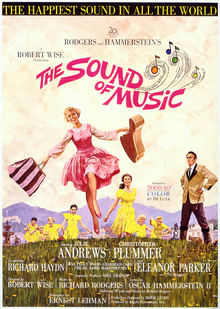| The Sound of Music | |
|---|---|
 Theatrical release poster by Howard Terpning | |
| Directed by | Robert Wise |
| Screenplay by | Ernest Lehman |
| Based on | |
| Produced by | Robert Wise |
| Starring | |
| Cinematography | Ted McCord |
| Edited by | William Reynolds |
| Music by | Richard Rodgers |
Production companies | Argyle Enterprises, Inc. |
| Distributed by | 20th Century-Fox |
Release date |
|
Running time | 174 minutes[1] |
| Country | United States |
| Language | English |
| Budget | $8.2 million[2][3] |
| Box office | $286.2 million[2] |
The Sound of Music is a 1965 American musical drama film produced and directed by Robert Wise from a screenplay written by Ernest Lehman, and starring Julie Andrews and Christopher Plummer, with Richard Haydn, Peggy Wood, Charmian Carr, and Eleanor Parker. The film is an adaptation of the 1959 stage musical composed by Richard Rodgers, with lyrics by Oscar Hammerstein II and a book by Lindsay and Crouse. It is based on the 1949 memoir The Story of the Trapp Family Singers by Maria von Trapp and is set in Salzburg, Austria. It is a fictional retelling of her experiences as governess to seven children, her eventual marriage with their father Captain Georg von Trapp, and their escape during the Anschluss in 1938.[4]
Filming took place from March to September 1964 in Los Angeles and Salzburg. The Sound of Music was released in the United States on March 2, 1965, initially as a limited roadshow theatrical release. Initial critical response to the film was mixed, but it was a major commercial success, becoming the number-one box office film after four weeks, and the highest-grossing film of 1965. By November 1966, The Sound of Music had become the highest-grossing film of all-time, surpassing Gone with the Wind, and it held that distinction for five years. The film was popular throughout the world, breaking previous box-office records in 29 countries. It had an initial theatrical release that lasted four and a half years and two successful re-releases. It sold 283 million admissions worldwide and earned a total worldwide gross of $286 million.
The Sound of Music received five Academy Awards, including Best Picture and Best Director.[5] The film also received Golden Globe Awards for Best Motion Picture and Best Actress, the Directors Guild of America Award for Outstanding Directorial Achievement, and the Writers Guild of America Award for Best Written American Musical. In 1998, the American Film Institute (AFI) listed The Sound of Music as the 55th greatest American film of all time, and the fourth-greatest film musical. In 2001, the United States Library of Congress selected the film for preservation in the National Film Registry, finding it "culturally, historically, or aesthetically significant".
The movie is not very well known in Austria and Germany. The story of the Trapps has been popularized there more via the German movie The Trapp Family (1956) by Wolfgang Liebeneiner. It is a bit closer to the real events and features authentic folk songs instead of Broadway songs.[6]
- ^ Cite error: The named reference
tcm-printwas invoked but never defined (see the help page). - ^ a b Cite error: The named reference
numberswas invoked but never defined (see the help page). - ^ Solomon 1989, p. 254.
- ^ Yoffe, Emily (August 8, 1993). "Hollywood's Widower Fantasy". The New York Times. ISSN 0362-4331. Archived from the original on February 5, 2017. Retrieved February 5, 2017.
- ^ Bernstein, Adam (September 16, 2005). "'Sound of Music,' 'West Side Story' Director Robert Wise Dies". The Washington Post. Archived from the original on December 28, 2020. Retrieved December 28, 2020.
- ^ Uta Gruenberger (September 2, 2010), "Salzburg: Edelweiß, Edelweiß", Die Zeit, no. 30/2010